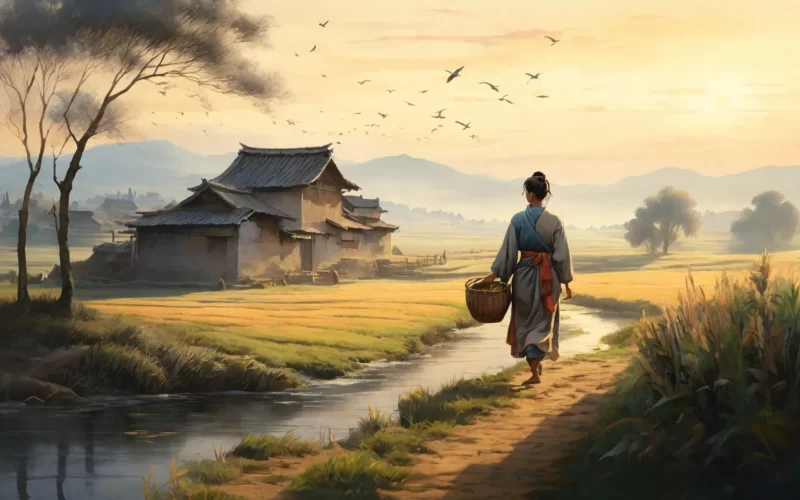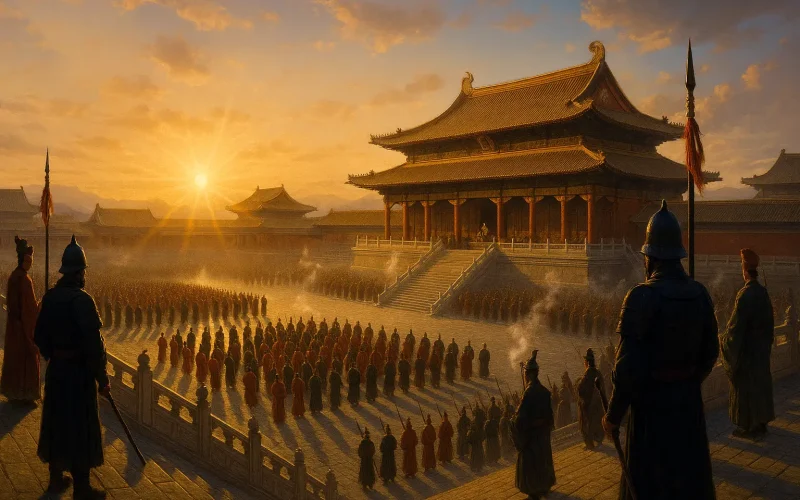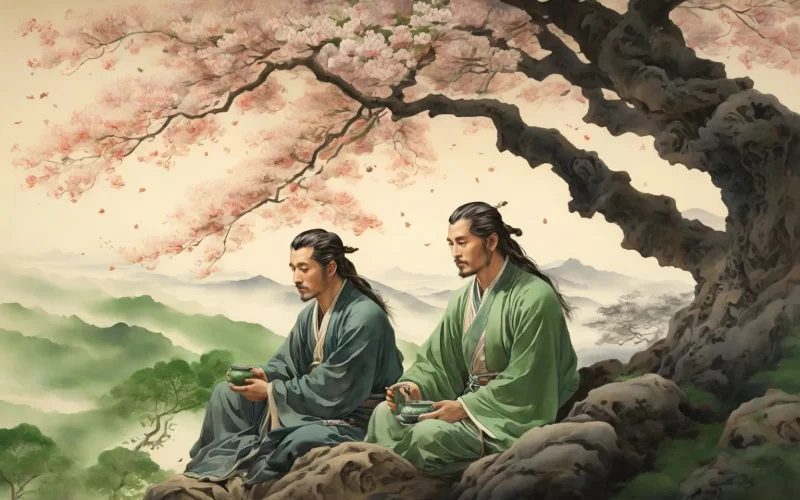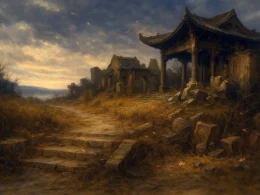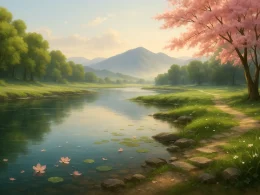The woods have stored the rain, and slow comes the smoke
As rice is cooked on faggots and carried to the fields;
Over the quiet marsh-land flies a white egret,
And mango-birds are singing in the full summer trees....
I have learned to watch in peace the mountain morningglories,
To eat split dewy sunflower-seeds under a bough of pine,
To yield the post of honour to any boor at all....
Why should I frighten sea gulls, even with a thought?
Original Poem
「积雨辋川庄作」
王维
积雨空林烟火迟, 蒸藜炊黍饷东灾。
漠漠水田飞白鹭, 阴阴夏木啭黄鹂。
山中习静观朝槿, 松下清斋折露葵。
野老与人争席罢, 海鸥何事更相疑?
Interpretation
Composed during Wang Wei's reclusive years at his Wangchuan Estate near Lantian, this poem exemplifies his signature "painting within poetry, Zen within painting" aesthetic. The estate, nestled beneath the Zhongnan Mountains with its harmonious blend of forests and farmland, provided the perfect setting for this masterpiece depicting post-rain scenery and rural life, reflecting the poet's spiritual clarity and transcendental harmony with nature.
First Couplet: "积雨空林烟火迟,蒸藜炊黍饷东菑。"
Jī yǔ kōng lín yān huǒ chí, zhēng lí chuī shǔ xiǎng dōng zī.
"After long rains, damp woods slow the hearth's glow; / Steamed greens and millet for field workers go."
The delayed kindling ("slow the hearth's glow") vividly captures the humid atmosphere, while the villagers' simple meal delivery illustrates harmonious coexistence with nature, revealing Wang's affinity for pastoral life.
Second Couplet: "漠漠水田飞白鹭,阴阴夏木啭黄鹂。"
Mò mò shuǐ tián fēi bái lù, yīn yīn xià mù zhuàn huáng lí.
"Vast wetlands where egrets sweep; / Dark summer woods where orioles weep."
The reduplicatives "vast" (漠漠) and "dark" (阴阴) create spatial depth, while the "egrets" and "orioles" add chromatic vibrancy and auditory texture—a multisensory landscape painting unfolding through verse.
Third Couplet: "山中习静观朝槿,松下清斋折露葵。"
Shān zhōng xí jìng guān zhāo jǐn, sōng xià qīng zhāi zhé lù kuí.
"Mountain stillness: I watch morning glories fade; / Pine-shaded purity: dew-kissed mallows plucked for aid."
The poet's daily Zen practice emerges—observing ephemeral hibiscus blossoms (symbolizing life's impermanence) and gathering sun-dew greens (embodying ascetic simplicity), fusing spiritual cultivation with natural rhythms.
Fourth Couplet: "野老与人争席罢,海鸥何事更相疑?"
Yě lǎo yǔ rén zhēng xí bà, hǎi ōu hé shì gèng xiāng yí?
"Like Zhuangzi's old man who quit worldly seats, / Why would gulls still doubt my retreats?"
Alluding to Daoist parables, the rhetorical question conveys his non-attachment while humorously acknowledging society's lingering suspicions about recluses—a tone blending transcendence with self-deprecation.
Holistic Appreciation
The poem's structure progresses meticulously: from rain-soaked landscapes to villagers' routines, then to the poet's contemplative practices, culminating in philosophical resolution. Wang Wei's tranquil imagery—damp woods, watery fields, singing birds—builds toward his Zen realization of non-duality between self and nature. The final allusions crystallize his detachment, completing a journey from observation to enlightenment.
Artistic Merits
The entire poem exemplifies Wang Wei's signature style of "painting within poetry and Zen within painting." With deceptively simple brushstrokes yet profound artistic conception, it employs minimalist language to capture the refreshing tranquility of post-rain countryside. Structurally, it follows a deliberate "scene-activity-person-philosophy" progression, unfolding layer by layer with deepening insight. The language sparkles with natural elegance and vivid chromaticism—the reduplicated descriptors "vast" (漠漠) and "shadowed" (阴阴) enhance pictorial depth, while the concluding allusions infuse philosophical richness, elevating the work from serene nature observation to enlightened life understanding, achieving an enduringly contemplative style.
Insights
Beyond depicting reclusive joy, the poem models how to cultivate spiritual freedom within nature's rhythms. Wang's practice—observing fleeting flowers while harvesting simple greens—suggests that enlightenment lies in mindful engagement with life's ephemerality. His example remains vital for modern seekers balancing societal demands with inner peace.
Poem translator
Kiang Kanghu
About the poet

Wang Wei (王维), 701 - 761 A.D., was a native of Yuncheng, Shanxi Province. Wang Wei was a poet of landscape and idylls. His poems of landscape and idylls, with far-reaching images and mysterious meanings, were widely loved by readers in later generations, but Wang Wei never really became a man of landscape and idylls.






